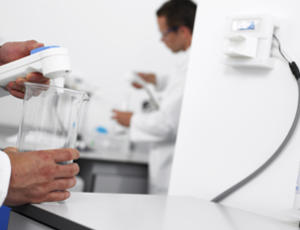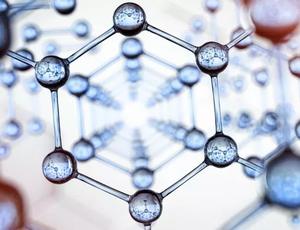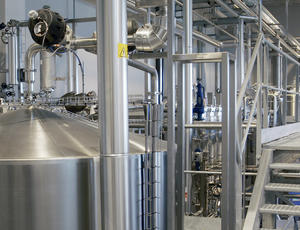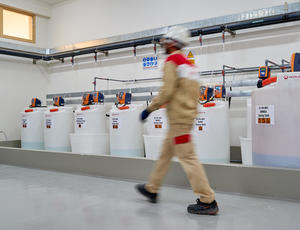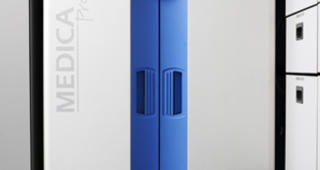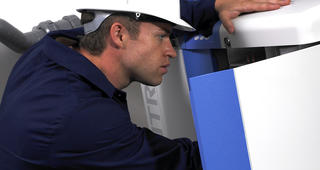A water purification range specifically designed to meet the high-purity needs of laboratory water.
Overview
The PureLab water purification technology range of devices delivers consistent high water purity — ultrapure water and pure water — to laboratories needing low to mid volumes daily, with economical and effortless operation as well as maintenance at the core of the design.
The modular systems can be easily configured to deliver the water qualities needed across numerous applications. They have a simple yet sophisticated design and enable you to precisely dispense any chosen volume of water, at the exact quality you need.
By removing impurities from water, PureLab systems are suitable for all levels of consumption with the benefit of real-time monitoring of resistivity and total organic carbon (TOC) in a compact and ergonomic design.
The PureLab family is an innovative and flexible product range, specially designed to meet laboratory water purification needs.
Features and benefits

Designed to make laboratory work simpler

Easy to set up

Ultrapure water delivery via a comfortable and flexible handset

Large, easy-to-read digital display

Height-adjustable water dispensing outlet

Selectable manual dispensing, continuous dispensing and preset water volume dispensing

Easy sanitization in as little as 15 minutes

Capture and transfer data easily via the USB port
Applications
Services
Resources & Product range
PureLab® Quest
The first water purification devices on the market that dispense on-demand Type 1, 2 and 3 grade water from an economical, easy-to-use device that is manufactured from 85% reclaimed material. Compact and wall-mountable, it saves lab space.
PureLab® Chorus
With its simple and ergonomic design, this range provides a complete solution from tap to ultrapure water directly from a potable water supply. It ensures peak water purity at 18.2 MΩ.cm through fully recirculating water.
PureLab® Flex
The range features six laboratory water systems with varying volumes and pressures, ensuring accurate delivery of pure water. It provides real-time monitoring of resistivity and TOC, featuring a comfortable hand dispenser, adjustable outlet and user-friendly digital display.
Contact
Whether you’re an academic, lab manager, or clinical researcher, it is our mission to facilitate your advanced research. We do this by ensuring you get accurate results by guaranteeing your laboratory water quality, every time.
What defines type 1, 2 and 3 water?
Water is classified into three types: Type 1, Type 2 and Type 3 water, each with varying levels of purity to meet specific laboratory and industrial needs.
- Type 1, also known as ultrapure water, is of the highest quality, free from nearly all impurities and suited for critical analytical and life science applications.
- Type 2, also known as pure water, is suitable for general lab use and non-critical applications.
- Type 3, also known as general laboratory water, is commonly used in feeding autoclaves and dishwashers.
The specific quality and standards for these water types may vary depending on industry, regulation body and application requirements, making it essential to follow relevant guidelines and standards to ensure the right water quality for a given purpose.
How important is water quality in laboratory performance?
Water quality is of paramount importance in laboratory performance as it directly affects the reliability and accuracy of experimental results. Impurities in water can interfere with analytical research as impurities will directly affect retention time causing negative peaks, additional (ghost) peaks, split peaks and loss of resolution in analytical results making it challenging to distinguish between actual effects and contaminants.
In genetics and genomics you need to be aware of RNase and DNase, bacteria and endotoxins. Therefore requiring a higher level of water purification.
How can water purity be maintained in laboratory work?
Maintaining water purity in laboratory work involves a combination of preventive measures and regular system maintenance.
The key steps include utilizing water purification systems, such as reverse osmosis, deionization, ultraviolet and filtration to produce water of the required quality (Type 1, Type 2, or Type 3) for specific applications. Routine monitoring of these systems through measurements of water resistivity and conductivity, total organic carbon (TOC), temperature and other relevant parameters is essential to ensure consistent water quality.
Case Studies

Researchers at the University of Leipzig carry out forensic DNA analyses to provide evidence to support the police and public prosecutors in criminal cases. Ultrapure water is vital in ensuring accurate results. A PureLab® Quest purification system provides forensic scientists with a reliable and convenient supply of ultrapure water (18.2 MΩ) and is attached directly to a sink tap for ease of use.

Scientists at the Institute of Gene Research at Yamaguchi University are using comprehensive genetic analysis to investigate chronic illnesses such as cancer, dementia and cardiovascular disease. To ensure their success, they rely on PureLab® Quest to deliver high-quality ultrapure water that is processed to remove all contaminants and impurities — even harmless minerals such as calcium, magnesium, sodium, potassium and phosphorus.

Researchers at the National Graphene Institute (NGI) at the University of Manchester are developing a graphene-based membrane with the aim of cleaning up contaminated industrial water, desalinating seawater and purifying gasoline from water. To do this, the team requires ultrapure water to carry out molecular separation experiments. Responsible for the water quality is PureLab® Quest which provides a reliable and convenient supply of ultrapure water (18.2 MΩ).



